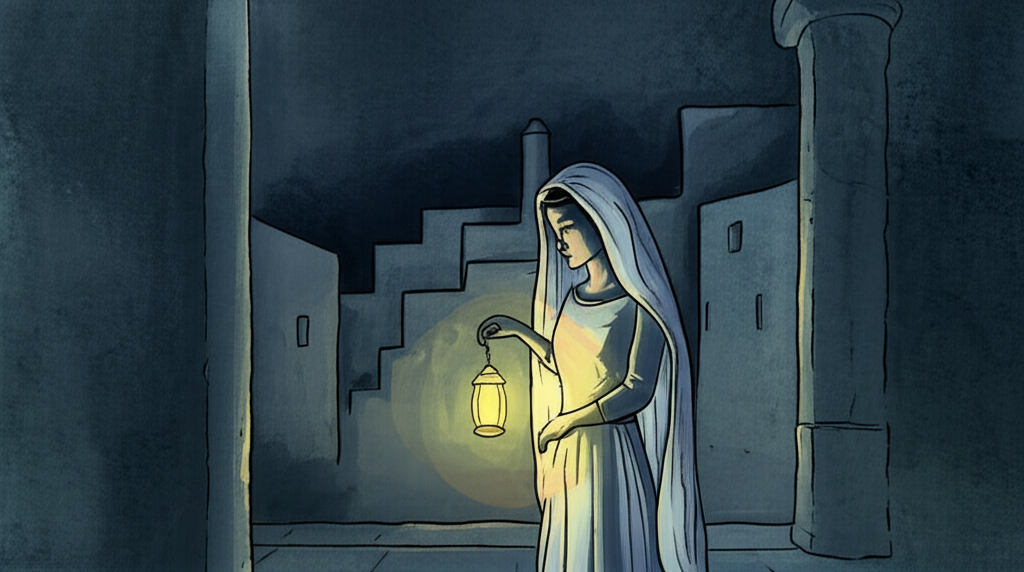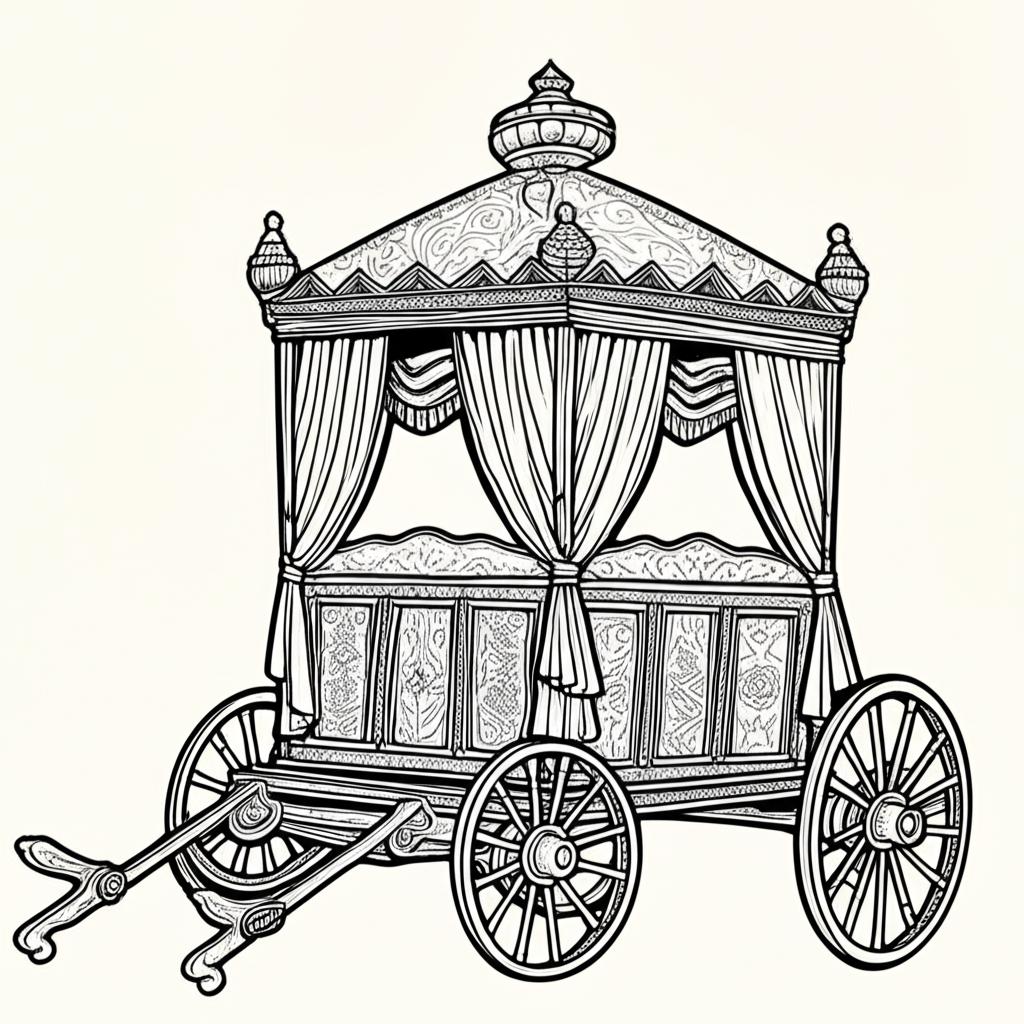Song Of Solomon 3 meaning explained in AI Summary
Chapter 3 of the Song of Solomon continues the theme of longing and desire. The woman describes her search for her beloved at night, expressing her determination to find him. She encounters the watchmen of the city and seeks their help in finding him.
The man then appears, describing his journey through the city at night, searching for his beloved. He expresses his longing for her and his desire to be with her.
Meaning and Significance
- The Search for Love: The woman's search for her beloved symbolizes the human desire for connection and fulfillment.
- The Nighttime Setting: The nighttime setting adds a sense of mystery and intensity to the search.
- Mutual Longing: The fact that both the man and woman are searching for each other highlights the reciprocal nature of their love.
Application
- Perseverance in Love: The chapter encourages perseverance in seeking love and connection.
- The Intensity of Love: It reminds us of the powerful emotions that can be experienced in love.
- The Mystery of Love: The nighttime setting suggests the mysterious and elusive nature of love.
Overall, Chapter 3 of the Song of Solomon continues to explore the powerful emotions of love and desire, emphasizing the intensity and perseverance of the lovers in their pursuit of each other.
Song Of Solomon 3 bible study ai commentary
This chapter portrays love's journey from anxious separation to glorious, public union. It opens with the Shulamite's desperate search for her beloved in a dream-like sequence, culminating in her finding and clinging to him. This personal experience of longing and reunion transitions dramatically into a majestic public spectacle: the royal wedding procession of King Solomon, celebrated by all. The chapter masterfully contrasts private insecurity with public security and celebration, highlighting that love, though deeply personal, is also meant for community affirmation and joyful display.
Song of Solomon 3 Context
The Song of Solomon is Wisdom Literature, a collection of love poems celebrating human love and sexuality within the context of marriage. Historically, it is set in the royal court of ancient Israel, likely during a time of prosperity that could afford such lavish descriptions as the wedding procession. Culturally, marriage was a cornerstone of society, and this song elevates it by using language often reserved for the divine, presenting an idealized vision of love. This serves as a stark contrast, or polemic, to the fertility cults of neighboring nations (like Baal worship in Canaan), which involved ritualized, impersonal sex. The Song champions exclusive, covenantal, and deeply personal love as the ideal.
Song of Solomon 3:1
"On my bed by night I sought him whom my soul loves; I sought him, but found him not."
In-depth-analysis
- "On my bed": The setting is intimate and personal, a place of rest but now one of restlessness and longing.
- "by night": Represents a time of vulnerability, fear, and separation. Biblically, night can symbolize trial, spiritual darkness, or distance from God.
- "him whom my soul loves": The Hebrew 'eth she'ahavah nafshi (אֵת שֶׁאָהֲבָה נַפְשִׁי) is a recurring and central phrase. Nefesh (soul) signifies the totality of her being—her life, breath, and inner self. This is not a superficial affection; it's a deep, all-encompassing love.
- "I sought him, but found him not": The repetition of "sought" emphasizes her desperation and active search. The initial failure to find him creates dramatic tension and reflects the real anxieties that can occur in a relationship.
Bible references
- Psalm 63:1: "O God, you are my God; earnestly I seek you; my soul thirsts for you..." (A soul's deep longing for the beloved).
- Isaiah 26:9: "My soul yearns for you in the night; my spirit within me earnestly seeks you..." (Seeking God in the "night" of distress).
- John 20:13-15: Mary Magdalene weeping at the tomb, "They have taken away my Lord, and I do not know where they have laid him." (Distress and searching for the beloved who is absent).
Cross references
Psa 42:1-2 (longing soul); Psa 77:2-4 (seeking God in the night); Isa 55:6 (seeking the Lord).
Song of Solomon 3:2
"I will rise now and go about the city, in the streets and in the squares; I will seek him whom my soul loves. I sought him, but found him not."
In-depth-analysis
- "I will rise now": A shift from passive longing to active, determined searching. Her love compels her to action despite the dangers of a city at night for an unescorted woman.
- "go about the city, in the streets and in the squares": She moves from the private, safe space (her room) to the public, potentially dangerous space. This highlights the risk and extent of her search. Her love is greater than her fear.
- "I sought him, but found him not": The refrain of failure continues, heightening the sense of panic and separation. The search is frantic and so far, fruitless.
Bible references
- Luke 15:8: "Or what woman, having ten silver coins, if she loses one coin, does not light a lamp and sweep the house and seek diligently until she finds it?" (A parable of diligent searching).
- Proverbs 1:20-21: "Wisdom cries aloud in the street, in the markets she raises her voice..." (The city squares as a place of public searching/proclamation).
- Jeremiah 5:1: "Run to and fro through the streets of Jerusalem, look and take note! Search her squares to see if you can find one man who does justice..." (Searching the city).
Cross references
Lam 2:11-12 (distress in the city streets); Jer 29:13 (promise of finding God when sought wholeheartedly); Luke 2:48-49 (Mary and Joseph anxiously searching for Jesus).
Song of Solomon 3:3
"The watchmen who go about the city found me. 'Have you seen him whom my soul loves?'"
In-depth-analysis
- "The watchmen": These are the city guards, symbols of authority and security. In this context, they represent an official structure that is either unable or unwilling to help in her deeply personal quest.
- "found me": This implies she is out of place, perhaps even seen as a woman of ill repute for being out alone at night. There's a subtle danger in the encounter.
- "'Have you seen...?'": Her question is direct and singular in focus. She doesn't explain or justify herself; her entire world has narrowed to this one quest. The formal authorities of the "city" cannot help her find the one her "soul" loves. This can symbolize how human structures or organized religion can sometimes fail to connect us with the one we truly seek.
Bible references
- Isaiah 62:6: "On your walls, O Jerusalem, I have set watchmen; all the day and all the night they shall never be silent." (Watchmen as intercessors).
- Ezekiel 3:17: "Son of man, I have made you a watchman for the house of Israel." (Watchmen as spiritual guardians).
- John 1:35-37: The disciples of John asking where Jesus stays. (Asking for guidance to find the one).
Cross references
Isa 21:11-12 (question to a watchman); Psa 127:1 (unless the LORD watches over the city, the watchmen stay awake in vain).
Song of Solomon 3:4
"Scarcely had I passed them when I found him whom my soul loves. I held him, and would not let him go until I had brought him into my mother's house, and into the chamber of her who conceived me."
In-depth-analysis
- "Scarcely had I passed them": She finds her beloved immediately after moving past the official "watchmen." Her success comes from her own relentless pursuit, not from external help. This emphasizes the personal nature of the relationship.
- "I found him": The climax of her search. The tension is released, replaced by the joy of reunion.
- "I held him, and would not let him go": The Hebrew 'achaz (אָחַז) means to grasp or seize firmly. It shows a desperate, powerful resolve to never be separated again.
- "my mother's house": This is a place of family approval, legitimacy, and safety. In that culture, a courtship would culminate in a formal union approved by the family. Bringing him here signifies her desire for a public, secure, and permanent commitment—marriage. It is the safe and proper context for their love.
Bible references
- Genesis 2:24: "...therefore a man shall leave his father and his mother and hold fast to his wife, and they shall become one flesh." (The theme of holding fast in committed union).
- John 20:16-17: Mary Magdalene recognizing and clinging to the resurrected Jesus, who says, "Do not cling to me..." (A parallel of finding the beloved and holding on).
- Genesis 24:67: "Then Isaac brought her into the tent of Sarah his mother and took Rebekah, and she became his wife, and he loved her." (Bringing the bride to the matriarchal tent signifies marriage).
Cross references
Pro 4:13 (hold on to instruction); Rut 1:14-16 (Ruth clinging to Naomi); Rev 3:11 (hold fast what you have).
Song of Solomon 3:5
"I adjure you, O daughters of Jerusalem, by the gazelles or the does of the field, that you not stir up or awaken love until it pleases."
In-depth-analysis
- This verse is a recurring refrain (see also 2:7, 8:4), acting as a structural marker that concludes a major section.
- "I adjure you": A solemn, oath-like charge.
- "by the gazelles or the does of the field": These animals are beautiful, wild, and shy. The oath invokes the beauty and freedom of nature, suggesting that love is just as wild and powerful and cannot be forced or controlled. It must arise naturally and in its proper time.
- "not stir up or awaken love until it pleases": This is the central lesson. Love has its own timing. It cannot be rushed, manipulated, or artificially induced. This speaks to patience in romance and, allegorically, patience in waiting for God's divine timing.
Bible references
- Ecclesiastes 3:1, 8: "For everything there is a season, and a time for every matter under heaven... a time to love, and a time to hate..." (Divine timing for all things).
- Habakkuk 2:3: "For still the vision awaits its appointed time; it hastens to the end—it will not lie. If it seems slow, wait for it; it will surely come..." (The importance of waiting for God's appointed time).
Cross references
Psa 27:14 (wait for the Lord); Gal 6:9 (reaping at the proper time); Lam 3:25-26 (good to wait for the Lord's salvation).
Song of Solomon 3:6
"What is that coming up from the wilderness like pillars of smoke, perfumed with myrrh and frankincense, with all the fragrant powders of a merchant?"
In-depth-analysis
- The scene shifts dramatically from the private, internal drama of the Shulamite to a grand, public spectacle. The question "What is that?" creates anticipation.
- "from the wilderness": The wilderness is a place of testing and transition in the Bible. Something powerful and glorious is emerging from it.
- "like pillars of smoke": This powerfully evokes the shekinah glory of God leading the Israelites. The Hebrew tîmĕrôwth 'ashan (תִּימֲרוֹת עָשָׁן) is a rare phrase, tying this procession to divine imagery.
- "myrrh and frankincense": These are costly, royal, and priestly perfumes. Myrrh was used for anointing and burial, while frankincense was a key component of temple incense offered to God. Their presence signifies royalty, holiness, and great value.
Bible references
- Exodus 13:21: "And the LORD went before them by day in a pillar of cloud to lead them along the way, and by night in a pillar of fire..." (The divine pillar of God's presence).
- Joel 2:30: "...blood and fire and columns of smoke." (Columns of smoke as a sign of the Day of the Lord's coming).
- Matthew 2:11: The Magi offered the infant Jesus gifts of "gold and frankincense and myrrh." (Royal and divine gifts).
Cross references
Exo 30:34-36 (frankincense in the holy Tabernacle incense); Psa 45:8 (garments fragrant with myrrh); Lev 16:12-13 (incense cloud in the Holy of Holies).
Song of Solomon 3:7-8
"Behold, it is the litter of Solomon! Around it are sixty mighty men, of the mighty men of Israel, all of them wearing swords and expert in war, each with his sword at his thigh, against the terror by night."
In-depth-analysis
- "the litter of Solomon": The Hebrew is mittah, meaning bed, but here a royal palanquin or portable couch. It's Solomon's royal transport.
- "sixty mighty men": These are elite warriors, his personal guard. The number sixty may be symbolic, representing a complete and sufficient protective force (6 x 10). They contrast sharply with the ineffective "watchmen" from the earlier scene.
- "expert in war... sword at his thigh": This emphasizes their readiness and skill. They are not ceremonial guards; they are proven warriors providing real protection.
- "against the terror by night": This phrase directly answers the fear expressed in the first section (v. 1). The bride was alone and afraid in the night; the bridegroom arrives with a force that dispels all "terror by night." He brings ultimate security.
Bible references
- Psalm 91:5: "You will not fear the terror of the night, nor the arrow that flies by day." (God's protection from night terrors).
- Nehemiah 4:17-18: "Those who carried burdens were loaded in such a way that each labored on the work with one hand and held his weapon with the other." (Building and guarding simultaneously).
- 2 Kings 6:16-17: Elisha and his servant are surrounded by the Syrian army, but Elisha prays, "and behold, the mountain was full of horses and chariots of fire all around Elisha." (The unseen divine army providing protection).
Cross references
1 Sam 22:1-2 (David's mighty men); 2 Sam 23:8 (list of David's mighty men); Eph 6:11 (put on the whole armor of God).
Song of Solomon 3:9-10
"King Solomon made himself a carriage from the wood of Lebanon. He made its posts of silver, its back of gold, its seat of purple; its interior was inlaid with love by the daughters of Jerusalem."
In-depth-analysis
- "made himself a carriage": The carriage, or 'appiryôn (אַפִּרְיוֹן), is a symbol of the king's glory and his desire to honor his bride. This isn't just a functional item; it is a masterpiece of craftsmanship.
- "wood of Lebanon": Cedar from Lebanon was the most prized building material in the ancient world, used for palaces and the Temple (1 Kings 5-7). It signifies strength, beauty, and immense value.
- "silver... gold... purple": These are materials of royalty and the sanctuary/tabernacle (Exo 25-27). Silver (atonement, value), Gold (divinity, purity), and Purple (royalty, wealth) elevate the carriage to a sacred level of importance.
- "inlaid with love by the daughters of Jerusalem": The final, most precious element is not a material but an abstract: "love" ('ahavah, אַהֲבָה). This carriage, representing the security and structure of their relationship, is ultimately built and adorned with love from the community, for the bride.
Bible references
- 1 Kings 10:27: "And the king made silver as common in Jerusalem as stone..." (The splendor of Solomon's reign).
- Exodus 26:15, 19, 32: The extensive use of acacia wood, silver, and gold in the construction of the Tabernacle. (A parallel of building a precious, sacred structure).
- Esther 1:6: "...hangings of fine white and violet linen... on silver rods and marble pillars, and also couches of gold and silver..." (The materials of Persian royalty).
Cross references
Hag 2:8 (The silver is mine, and the gold is mine); Pro 31:22 (She makes bed coverings for herself; her clothing is fine linen and purple); Eze 27:7 (fine embroidered linen from Egypt and blue and purple from the coastlands of Elishah).
Song of Solomon 3:11
"Go out, O daughters of Zion, and look upon King Solomon, with the crown with which his mother crowned him on the day of his wedding, on the day of the gladness of his heart."
In-depth-analysis
- "Go out, O daughters of Zion": An invitation to the community to witness this glorious event. "Zion" is a more sacred term for Jerusalem, invoking its covenantal relationship with God.
- "look upon King Solomon": The focus shifts entirely to the king in all his splendor. He is the center of this celebration.
- "the crown with which his mother crowned him": This is a unique detail. Typically, a king is crowned at his coronation. This crowning, by his mother (Bathsheba), is for his wedding day. It frames the wedding as an event of royal significance, equal to a coronation. It emphasizes that this is his highest moment.
- "day of his wedding... day of the gladness of his heart": The wedding is presented as the peak of the king's joy. All his glory, wealth, and power are displayed in service of this union, which is the source of his deepest happiness.
Bible references
- Psalm 45:11, 15: A royal wedding psalm where the king desires the bride's beauty and she is led "with joy and gladness." (The joy of a royal wedding).
- Isaiah 61:10: "...he has clothed me with the garments of salvation... as a bridegroom decks himself with a garland, and as a bride adorns herself with her jewels." (The groom adorned for his wedding day).
- Revelation 19:7: "Let us rejoice and exult and give him the glory, for the marriage of the Lamb has come, and his Bride has made herself ready." (The ultimate wedding day of Christ and the Church).
Cross references
Isa 62:5 (As a bridegroom rejoices over his bride); Heb 2:9 (Jesus, crowned with glory and honor); Joh 3:29 (The friend of the bridegroom rejoices to hear the bridegroom's voice).
Song of Solomon chapter 3 analysis
- Structural Progression: The chapter exhibits a powerful movement from private to public, from fear to security. It begins with one woman's internal, nocturnal anxiety and concludes with a community-wide, daylight celebration of the king's glory and love.
- Theological Parallel (Christ and the Church): This chapter is rich in typology.
- The Search (v. 1-4): The believer/Church in a time of spiritual "night," feeling separated from Christ, seeks Him earnestly. The "watchmen" (human/religious institutions) cannot provide the answer. The believer finds Christ through personal, relentless seeking. Finding Him, the believer holds fast, desiring to bring him into the "mother's house" (the fellowship of the church, a place of safety and confirmation).
- The Arrival (v. 6-11): This is a powerful picture of Christ, the Bridegroom King. He comes "from the wilderness" (this world) in glory ("pillars of smoke"), His divine nature signified by frankincense. He provides ultimate security against the "terror by night" (sin, death, the devil) with his "mighty men" (angels). His "carriage" is the church, built with the best materials (His righteousness) and "inlaid with love." His wedding day is the eschatological fulfillment, the great celebration, the "day of the gladness of his heart."
- The Two Searches: There is a stark contrast between the two "searches" in the chapter. First, the woman seeks the man in the dark, dangerous city. Second, the community is invited to "go out and look" for the man as he arrives in a glorious, secure procession. Love begins with a personal quest and culminates in a public revelation.
- Polemic against Fear: The chapter is a direct answer to fear. The "terror by night" in verse 8 is a direct response to the context of the woman's solitary search "by night" in verse 1. The solution to the fear of separation and danger is not found in the city's flawed security (the watchmen), but in the presence of the powerful and loving groom.
Song of Solomon 3 summary
A young woman recounts a dream-like search for her beloved, expressing anxious longing and the deep desire for security in their relationship. After a frantic search, she finds him and holds him fast. The scene then shifts to the magnificent public spectacle of King Solomon's royal wedding procession, portraying him as a glorious king who provides ultimate security and whose greatest joy is found on his wedding day, thus affirming that love moves from private longing to celebrated, secure union.
Song Of Solomon 3 AI Image Audio and Video









Song Of Solomon chapter 3 kjv
- 1 By night on my bed I sought him whom my soul loveth: I sought him, but I found him not.
- 2 I will rise now, and go about the city in the streets, and in the broad ways I will seek him whom my soul loveth: I sought him, but I found him not.
- 3 The watchmen that go about the city found me: to whom I said, Saw ye him whom my soul loveth?
- 4 It was but a little that I passed from them, but I found him whom my soul loveth: I held him, and would not let him go, until I had brought him into my mother's house, and into the chamber of her that conceived me.
- 5 I charge you, O ye daughters of Jerusalem, by the roes, and by the hinds of the field, that ye stir not up, nor awake my love, till he please.
- 6 Who is this that cometh out of the wilderness like pillars of smoke, perfumed with myrrh and frankincense, with all powders of the merchant?
- 7 Behold his bed, which is Solomon's; threescore valiant men are about it, of the valiant of Israel.
- 8 They all hold swords, being expert in war: every man hath his sword upon his thigh because of fear in the night.
- 9 King Solomon made himself a chariot of the wood of Lebanon.
- 10 He made the pillars thereof of silver, the bottom thereof of gold, the covering of it of purple, the midst thereof being paved with love, for the daughters of Jerusalem.
- 11 Go forth, O ye daughters of Zion, and behold king Solomon with the crown wherewith his mother crowned him in the day of his espousals, and in the day of the gladness of his heart.
Song Of Solomon chapter 3 nkjv
- 1 By night on my bed I sought the one I love; I sought him, but I did not find him.
- 2 "I will rise now," I said, "And go about the city; In the streets and in the squares I will seek the one I love." I sought him, but I did not find him.
- 3 The watchmen who go about the city found me; I said, "Have you seen the one I love?"
- 4 Scarcely had I passed by them, When I found the one I love. I held him and would not let him go, Until I had brought him to the house of my mother, And into the chamber of her who conceived me.
- 5 I charge you, O daughters of Jerusalem, By the gazelles or by the does of the field, Do not stir up nor awaken love Until it pleases.
- 6 Who is this coming out of the wilderness Like pillars of smoke, Perfumed with myrrh and frankincense, With all the merchant's fragrant powders?
- 7 Behold, it is Solomon's couch, With sixty valiant men around it, Of the valiant of Israel.
- 8 They all hold swords, Being expert in war. Every man has his sword on his thigh Because of fear in the night.
- 9 Of the wood of Lebanon Solomon the King Made himself a palanquin:
- 10 He made its pillars of silver, Its support of gold, Its seat of purple, Its interior paved with love By the daughters of Jerusalem.
- 11 Go forth, O daughters of Zion, And see King Solomon with the crown With which his mother crowned him On the day of his wedding, The day of the gladness of his heart.
Song Of Solomon chapter 3 niv
- 1 All night long on my bed I looked for the one my heart loves; I looked for him but did not find him.
- 2 I will get up now and go about the city, through its streets and squares; I will search for the one my heart loves. So I looked for him but did not find him.
- 3 The watchmen found me as they made their rounds in the city. "Have you seen the one my heart loves?"
- 4 Scarcely had I passed them when I found the one my heart loves. I held him and would not let him go till I had brought him to my mother's house, to the room of the one who conceived me.
- 5 Daughters of Jerusalem, I charge you by the gazelles and by the does of the field: Do not arouse or awaken love until it so desires.
- 6 Who is this coming up from the wilderness like a column of smoke, perfumed with myrrh and incense made from all the spices of the merchant?
- 7 Look! It is Solomon's carriage, escorted by sixty warriors, the noblest of Israel,
- 8 all of them wearing the sword, all experienced in battle, each with his sword at his side, prepared for the terrors of the night.
- 9 King Solomon made for himself the carriage; he made it of wood from Lebanon.
- 10 Its posts he made of silver, its base of gold. Its seat was upholstered with purple, its interior inlaid with love. Daughters of Jerusalem,
- 11 come out, and look, you daughters of Zion. Look on King Solomon wearing a crown, the crown with which his mother crowned him on the day of his wedding, the day his heart rejoiced.
Song Of Solomon chapter 3 esv
- 1 On my bed by night I sought him whom my soul loves; I sought him, but found him not.
- 2 I will rise now and go about the city, in the streets and in the squares; I will seek him whom my soul loves. I sought him, but found him not.
- 3 The watchmen found me as they went about in the city. "Have you seen him whom my soul loves?"
- 4 Scarcely had I passed them when I found him whom my soul loves. I held him, and would not let him go until I had brought him into my mother's house, and into the chamber of her who conceived me.
- 5 I adjure you, O daughters of Jerusalem, by the gazelles or the does of the field, that you not stir up or awaken love until it pleases.
- 6 What is that coming up from the wilderness like columns of smoke, perfumed with myrrh and frankincense, with all the fragrant powders of a merchant?
- 7 Behold, it is the litter of Solomon! Around it are sixty mighty men, some of the mighty men of Israel,
- 8 all of them wearing swords and expert in war, each with his sword at his thigh, against terror by night.
- 9 King Solomon made himself a carriage from the wood of Lebanon.
- 10 He made its posts of silver, its back of gold, its seat of purple; its interior was inlaid with love by the daughters of Jerusalem.
- 11 Go out, O daughters of Zion, and look upon King Solomon, with the crown with which his mother crowned him on the day of his wedding, on the day of the gladness of his heart.
Song Of Solomon chapter 3 nlt
- 1 One night as I lay in bed, I yearned for my lover.
I yearned for him, but he did not come. - 2 So I said to myself, "I will get up and roam the city,
searching in all its streets and squares.
I will search for the one I love."
So I searched everywhere but did not find him. - 3 The watchmen stopped me as they made their rounds,
and I asked, "Have you seen the one I love?" - 4 Then scarcely had I left them
when I found my love!
I caught and held him tightly,
then I brought him to my mother's house,
into my mother's bed, where I had been conceived. - 5 Promise me, O women of Jerusalem,
by the gazelles and wild deer,
not to awaken love until the time is right. - 6 Who is this sweeping in from the wilderness
like a cloud of smoke?
Who is it, fragrant with myrrh and frankincense
and every kind of spice? - 7 Look, it is Solomon's carriage,
surrounded by sixty heroic men,
the best of Israel's soldiers. - 8 They are all skilled swordsmen,
experienced warriors.
Each wears a sword on his thigh,
ready to defend the king against an attack in the night. - 9 King Solomon's carriage is built
of wood imported from Lebanon. - 10 Its posts are silver,
its canopy gold;
its cushions are purple.
It was decorated with love
by the young women of Jerusalem. - 11 Come out to see King Solomon,
young women of Jerusalem.
He wears the crown his mother gave him on his wedding day,
his most joyous day.
- Bible Book of Song Of Solomon
- 1 The Bride Confesses Her Love
- 2 The Bride Adores Her Beloved
- 3 The Bride's Dream
- 4 Solomon Admires His Bride's Beauty
- 5 The Bride Searches for Her Beloved
- 6 Together in the Garden of Love
- 7 The Bride Gives Her Love
- 8 Longing for Her Beloved